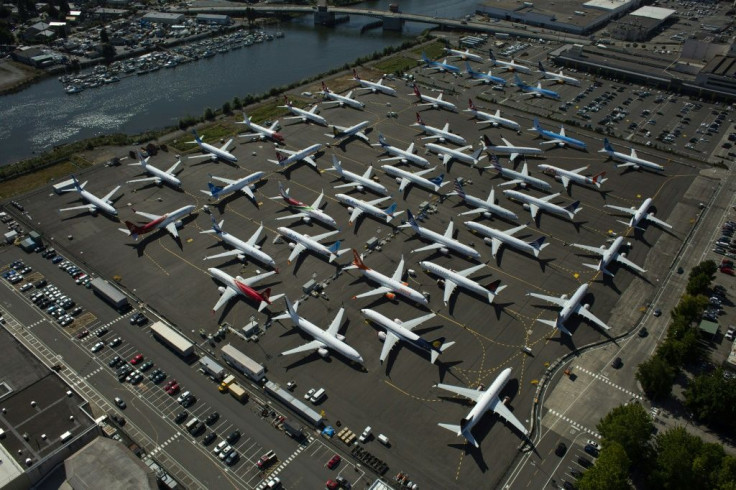Boeing's 737 Max And 777X Airliners Continue To Face Major Hurdles

Boeing (NYSE:BA) has been dealing with the fallout from two major accidents involving its 737 Max jetliners. While the company has stated that it hopes to see its new-model 737s return to service in the fourth quarter of 2019, new demands from European regulators are threatening to derail the already-tentative plans of the blue-chip aerospace giant.
Things took a turn for the worse recently when the 777X failed a structural test as its cargo door blew out. And Boeing suffered another setback earlier this week after its 777X jetliner was found to have a durability issue regarding the compressor of its new GE9X engine, something that will require a full redesign. While the news won't necessarily mean a production delay, it does undermine investor confidence in the company even further.
Ongoing 737 Max delays from European regulators
Boeing's efforts to bring its 737 Max airliners back to operational capacity might be set back even more, because the European Union Aviation Safety Agency (EASA) stated it would be reviewing the 737 Max on its own terms rather than trusting the certification process of the American Federal Aviation Administration (FAA). The executive director of EASA, Patrick Ky, told the European Parliament that Boeing still has failed to provide solutions to a number of issues EASA has identified.
This seems to indicate that there's a change in the international landscape in terms of how regulatory bodies interact with each other. Specifically, this decision from EASA to not rely on the FAA's assessments seems to show how much this crisis has shaken up the industry, even potentially creating rifts between these agencies.
Boeing, instead of being able to implement a global return of its 737 Max airliners, might have to bring them back into operation on a country-by-country basis now that regional regulators seem to be interested in independently testing the aircraft. From a financial perspective, Boeing has lost more than $8 billion in ground costs for the 737s and was hoping these expenditures would come to an end in Q4 with the planes' return to service. However, with more delays pending, this reprieve looks unlikely.
The 777X cargo-door incident
While the 737 Max is a major airliner for Boeing, the 777X is potentially far more important for its future revenue. The Boeing 777X was first launched back in 2013, earning $95 billion worth of orders from buyers. This ended up being the largest launch of its kind in commercial aviation history, with production being scheduled to start in 2017 and first deliveries arriving by 2020.
However, the airliner started to see problems back in 2018, when test flights of the 777X was postponed due to problems with the engine. With these issues continuing to linger following the announcement that the engine's compressor needed a complete redesign, Boeing placed some of the blame with General Electric (NYSE:GE), the manufacturer and supplier of its engines.
However, Boeing can't blame someone else for its own issues. Recently, a cargo door blew out of the fuselage on a final structural test. Boeing later explained this cargo-door incident as being due to depressurization of the aft fuselage, which occurred toward the final minutes of the test. However, the incident supposedly won't have an impact on the production and test schedule for the plane, according to a statement from Boeing.
"While our root cause assessment continues, at this time we do not expect that this will have a significant impact on aircraft design or on our overall test program schedule," said Boeing in an official press release.
Boeing's outlook
Some of Wall Street's top aerospace analysts agree with Boeing, saying that the incident likely isn't much to worry about. New York-based Bernstein said in a special report that while the failure was surprising, it could have stemmed from a relatively minor issue. "This could have been a latching failing, which would be relatively minor, or a structural issue, which could be more significant. Because of the similarity of the fuselage to the 777-300ER, we would be surprised to find a serious issue here," read the report.
Even if this latest glitch doesn't end up impacting the overall test schedule, I would argue that it isn't the real issue. Now that Boeing's airliners have gotten a reputation among some for being prone to failures (at least its newer models), even relatively minor accidents could be seen by regulators -- and potential buyers -- as proof that Boeing isn't as reliable as competitors such as Airbus (OTC:EADSY). The most important thing for Boeing is to earn back the trust of the market, something that could take a long time to accomplish at this rate.
This article originally appeared in the Motley Fool.
Mark Prvulovic has no position in any of the stocks mentioned. The Motley Fool has no position in any of the stocks mentioned. The Motley Fool has a disclosure policy.





















